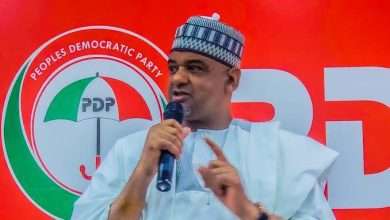
Gambian President Adama Barrow has taken the oath of office in neighbouring Senegal, while the country’s defeated longtime ruler refuses to step down from power, deepening a political crisis.
Barrow was inaugurated on Thursday in a hastily-arranged ceremony at Gambia’s embassy in the Senegalese capital, Dakar.
| |
“This is a day no Gambian will ever forget in a lifetime,” Barrow said in a speech immediately after being sworn in.
The small embassy room held about 40 people, including Senegal’s prime minister and the head of Gambia’s electoral commission.
Also at the event were officials from West Africa’s regional bloc, ECOWAS, which is threatening a military intervention to force outgoing president Yahya Jammeh, who lost an election last month, to step down.
The UN Security Council was set to vote later on Thursday on a draft resolution endorsing a military intervention by ECOWAS members to remove Jammeh.
Earlier on Thursday, sources told Al Jazeera that Isatou Njie Saidy, Gambia’s Vice President since 1997, had quit, becoming the highest level official to abandon Jammeh’s camp in his standoff with opposition Barrow, who won last month’s presidential election.
“Saidy’s resignation comes a series with defections among Jammeh’s entourage,” Al Jazeera’s Nicolas Haque, reporting from Dakar, said.
“Eight cabinet members have resigned saying they no longer stand with Jammeh. But despite all these defections, Jammeh is still not willing to concede defeat.”
Jammeh, whose mandate expired at midnight, came to power in a 1994 coup, had initially conceded defeat but a week later contested the December 1 poll’s results stating irregularities.
A former coup leader who has ruled the small West African country since 1994, Jammeh has resisted strong international pressure for him to step down.
African nations began stepping away from Jammeh, with Botswana announcing on Thursday it no longer recognised him as Gambia’s president.
His refusal to hand over power “undermines the ongoing efforts to consolidate democracy and good governance” in Gambia and Africa in general, it said.
Earlier this month, the African Union announced that it would no longer recognise Jammeh once his mandate expired.
At least 26,000 people have fled Gambia for Senegal since the start of the crisis fearing unrest, the UN’s refugee agency UNHCR said on Wednesday, citing Senegalese government figures.
source:Aljazeera






